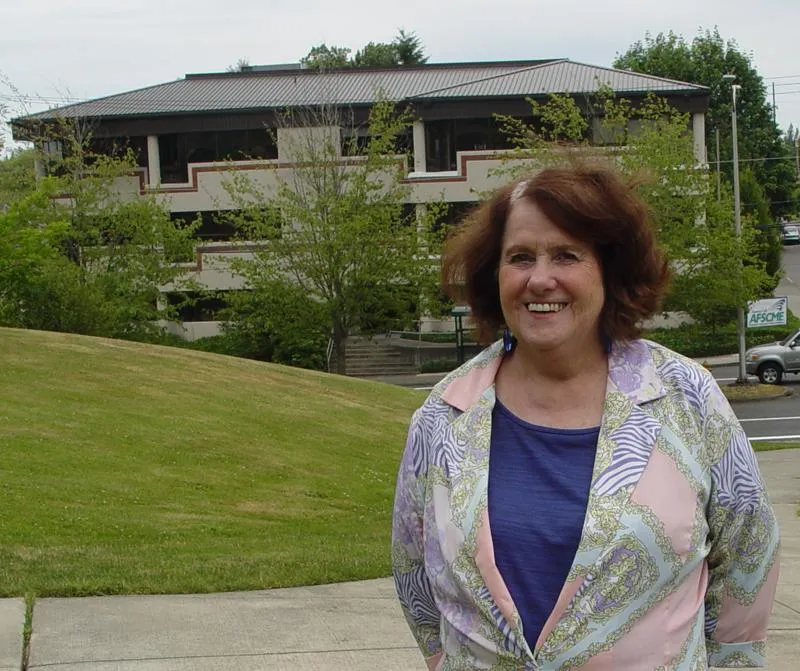Loss of Gladys Burbank Saddens WFSE

CELEBRATION OF LIFE FOR GLADYS BURBANK — OCT. 20 IN LACEY
The Celebration of Life for Gladys Burbank will be 2-5 p.m., Sunday, Oct. 20, 2019 at the Jacob Smith House, 4500 Intelco Loop S.E., Lacey, WA 98503.
Gladys Burbank’s sudden passing stunned the WFSE community. Coworkers and friends speak of her unyielding dedication to working people’s rights, her tireless work ethic, and her disarming sense of humor. During her jaw-dropping 36 years at WFSE, she founded the education and training program and served stints as organizing director and as the union’s Public Employment Relations Commission (PERC) director.
Carol Dotlich, an executive board member of the Retired Public Employees Council of WA and past WFSE president, knew Burbank for many years. The two worked closely together when Dotlich took office as president of WFSE in 2004.
“I worked with Gladys through the years, and she did a lot of jobs at the Federation,” said Dotlich. “She worked tirelessly over job classes and getting new units into the union.
“You would see Gladys leaving work with boxes and boxes of files, loading them into her car to take them home, so she could work on them at home, after hours. These were huge stacks of files.”
Burbank also made sure to make time for members.
“All that research and hard work really paid off, in improving the lives of members,” explained Dotlich. “If people asked her questions about things, she would take the time to make them understand it. She would give you her time."
Asked about Burbank’s effect on the lives of members, Dotlich said, “A lot of people owe their pay raises and their financial improvements to Gladys’ work. A lot of the groups that were organized and brought into the union, Gladys worked magic with that.”
Greg Devereux, Executive Director of WFSE, also knew Burbank well.
“She was the most passionate trade unionist I’ve met at the Federation,” he said. “She was absolutely committed to the labor movement. She would work for weeks and months straight to make sure workers had the right to be represented.”
Julianne Moore was grateful for Burbank’s work, too. She described Burbank as approachable, funny, and hard-working.
“If I had a question, and I couldn’t find anybody, Gladys would be the one that took the call. She always called back. Even if it was late at night, she’d call you back. The tougher the question, the more she liked it. She’d dig and dig and dig to get the answer,” said Moore.
Moore enumerated Burbank’s many skills.
“At Convention, she always did the new delegate workshop. I can’t tell you how many people, in my many years, I always tried to encourage to go through the new delegate class. She would give them a wealth of information.”
Burbank also excelled as a parliamentarian.
“You couldn’t find a better parliamentarian- she always did it politely, with a smile on her face. Even when things got contentious, Gladys would manage to bring people back to where they should be, with a smile.”
Burbank was humble and always put the needs of the members first, Moore said.
“When she got a good win for a job class that gave a good payment for each person, she was ecstatic—not for herself, but because it could make a difference in the members’ lives."
Burbank was not only known for her devotion to the members of WFSE, but also for her ability to make others laugh and to put them at ease. Dotlich described her way of inviting members in to new delegate orientations at WFSE conventions.
“The best thing about Gladys was that she had just the funniest sense of humor and she made everybody feel good,” said Dotlich. “When she was doing the new delegate orientations and training, she would make people laugh. She made them feel comfortable.”
Burbank was an educator, an organizer, a parliamentarian, and a dyed-in-the-wool unionist. She left behind a legacy of kindness and determination.
“She was truly sweet, and witty, and funny. She was really dedicated to the welfare of the membership—she was true blue union,” said Dotlich.
“It really meant a lot to her to be able to do that work, for working people,” Dotlich reflected. “She was dedicated to it. It was a calling, not just a job.”
